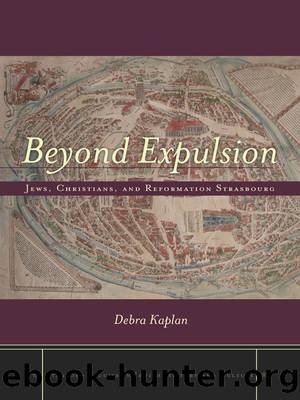Beyond Expulsion by Debra Kaplan

Author:Debra Kaplan [Kaplan, Debra]
Language: eng
Format: epub
Tags: History, Jewish
ISBN: 9780804779050
Google: LWTVuJR-hxQC
Publisher: Stanford University Press
Published: 2011-07-26T22:21:55+00:00
Seven
Constructing Jewish Memory
Self-Texts, the Reformation, and Narratives of Jewish History
The religious changes in the Christian world were not theologically relevant for Jews to the same degree that Hebraica and Judaica were critical for Protestant reformers. And yet, aside from the direct impact that the Reformation had upon those Jews living in the Empire, Jews took interest in these events, seeking to determine what the dissolution of a hitherto unified Latin Christendom meant for them. From as far away as Italy and the Ottoman Empire, Jews reported on Lutherâs teachings and excitedly discussed the acts of iconoclasm that had accompanied reform in some German cities.1 Among those Jews who reflected on the meaning of these events was Josel of Rosheim, who considered the Reformation in light of the larger narrative of the precarious Jewish position in the Empire, the expulsions and restrictions faced by Jews, and the often difficult relationship between Jews and non-Jews. He discussed the Reformation and its leaders as part of his larger examination of the contemporary Jewish experience, written in Hebrew and designed for Jewish readers. The texts that he composed comprise his interpretation of the Jewish role in the world, the place of Jews in history, and the relationship between Jews and their Christian neighbors. As some of the only remaining Hebrew texts from the Jewish community in sixteenth-century Alsace that were designed for internal Jewish consumption, Joselâs writings allow us a window into his inner world. His view of Jewish history placed the Jews at the center of the historical narrative, which confirmed, in this time of religious definition, that the Jews remained the chosen people of God. An analysis of Joselâs texts in tandem with his correspondence with and about the lay and religious Narratives of Jewish History leaders of Strasbourg permits a nuanced understanding of his ideology and how he perceived the Reformation.
In addition, although the interpretive strategies Josel employed in crafting his texts drew heavily upon those used by previous Jewish authors, they were undertaken in a new genre. His texts, which reflect a mix of his ideology and a description of the events and people with whom he interacted, have been categorized as ego-documents or self-texts, texts in which an author conducted self-exploration.2 This genre, which developed among both Jewish and Christian writers during the early modern period, confirms the shared cultural space inhabited by both Jews and Christians. The memoirs of Asher of Reichshofen, composed in the following century, attest to the persistence of this genre among the Jews of seventeenth-century Alsace.
Download
This site does not store any files on its server. We only index and link to content provided by other sites. Please contact the content providers to delete copyright contents if any and email us, we'll remove relevant links or contents immediately.
Room 212 by Kate Stewart(4108)
The Crown by Robert Lacey(4108)
Endurance: Shackleton's Incredible Voyage by Alfred Lansing(3847)
The Iron Duke by The Iron Duke(3641)
The Rape of Nanking by Iris Chang(3518)
Killing England by Bill O'Reilly(3458)
Joan of Arc by Mary Gordon(3260)
Say Nothing by Patrick Radden Keefe(3062)
I'll Give You the Sun by Jandy Nelson(2842)
Hitler's Monsters by Eric Kurlander(2734)
Shadow of Night by Deborah Harkness(2720)
Margaret Thatcher: The Autobiography by Thatcher Margaret(2687)
Mary, Queen of Scots, and the Murder of Lord Darnley by Alison Weir(2679)
Darkest Hour by Anthony McCarten(2649)
Blood and Sand by Alex Von Tunzelmann(2610)
Red Famine: Stalin's War on Ukraine by Anne Applebaum(2466)
Eleanor & Park by Rainbow Rowell(2395)
The One Memory of Flora Banks by Emily Barr(2349)
Book of Life by Deborah Harkness(2265)
